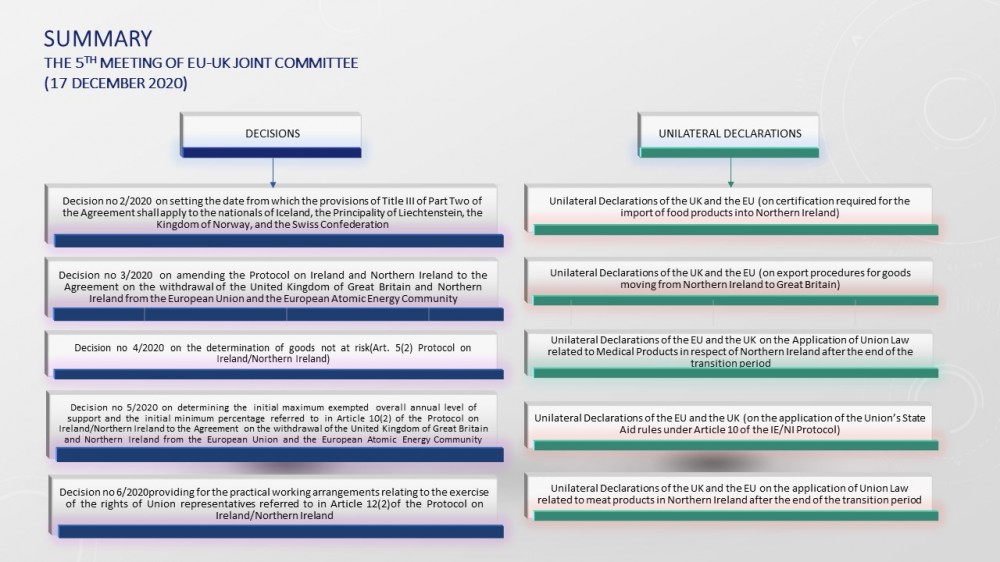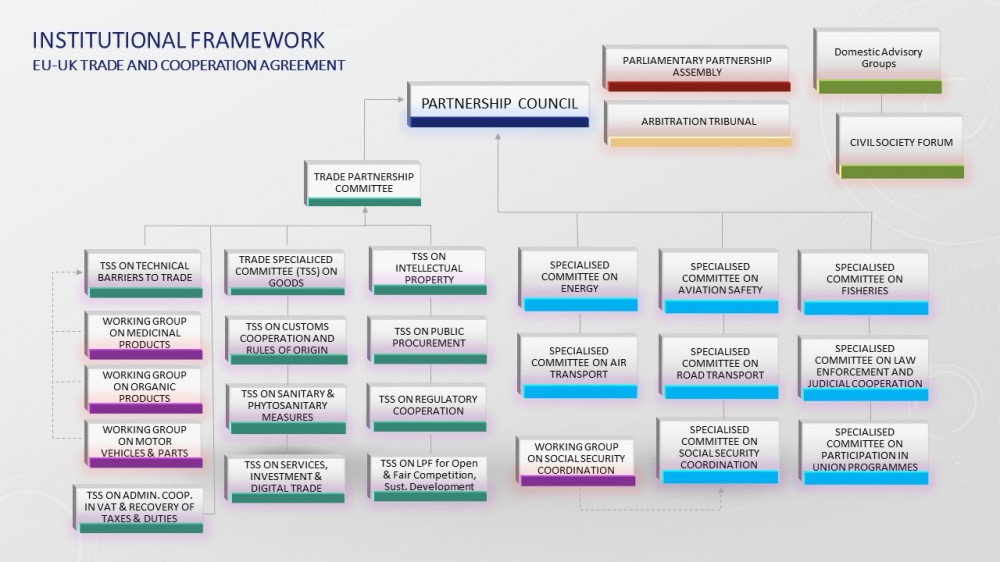The
Agreement on the withdrawal of the United Kingdom of Great Britain and Northern Ireland from the European Union and the European Atomic Energy Community (hereinafter –
Withdrawal Agreement) established the terms of the United Kingdom's orderly withdrawal from the EU, in accordance with Article 50 of the Treaty of the European Union. This Withdrawal Agreement entered into force on 1
st February 2020, but the transition period lasted until 31
st December 2020. The
Protocol on Ireland and Northern Ireland (hereinafter –
Protocol), which forms an integral part of the Withdrawal Agreement, also entered into force on 1
st February 2020, but most of its substantive provisions only become applicable after the end of the transition period.
During the transition period (1 February – 31 December 2020) the EU treated the UK as if it was a Member State, with the exception of participation in the EU institutions and governance structures. The EU and the UK used these months to negotiate new framework of relationships between EU and UK, in particular the EU-UK Trade and Cooperation Agreement. Consequently, the Withdrawal Agreement is fully operational from 1
st January 2021. The UK is no longer the EU Member State.
Implementation of Withdrawal Agreement
For the purpose of implementation and application of Withdrawal Agreement there was established a special Joint Committee, comprising representatives of the EU and of the UK (hereinafter –
EU-UK Joint Committee) in accordance with Article 164 of the Withdrawal Agreement.
On Thursday, 17 December 2020 the EU-UK Joint Committee held the fifth meeting via videoconference due to COVID-19 outbreak. Vice-President Maroš Šefčovič mentioned in his
press statement that the EU-UK Joint Committee had endorsed all required formal decisions and practical solutions, ensuring that the Withdrawal Agreement including the Protocol would be operational in time, as of 1
st January 2021.
During the fifth meeting the EU-UK Joint Committee took stock of Specialized Committees’ activity and progress since its last meeting on 19 October 2020; reviewed the state of Withdrawal Agreement implementation, notably in the areas of Citizens’ Rights and the Protocol; as well as agreed to continue to hold the EU-UK Joint Committee meetings regularly in 2021, once in a quarter at least. As a result, several essential decisions were adopted (see summary below).
 Protocol on Ireland and Northern Ireland
Protocol on Ireland and Northern Ireland
The overarching objective – to protect of the Good Friday (Belfast) Agreement, avoid a hard border on the island of Ireland, and maintain peace, stability and prosperity there – was achieved by virtue of the Withdrawal Agreement implementation, as Maroš Šefčovič has noted. Pursuing this goal, the EU and the UK made a series of unilateral declarations during the fifth meeting the EU-UK Joint Committee (see the summary above) to ensure an orderly, consensual approach to the enforcement of the Protocol, since its substantive provisions start to apply from 1
st January 2021.
Unilateral declarations cover a number of significant issues, including Border Control Posts specifically for checks on animals, plants and derived products, export declarations, the supply of medicines, the supply of meats, and other food products, and a clarification on the application of State aid rules under the terms of the Protocol. As part of these mutually agreed solutions, the UK has agreed to withdraw the contentious clauses of the UK Internal Market Bill, and will not introduce any similar provisions in the Taxation Bill.
Citizens’ Rights
Part Two “Citizens’ Rights” of the Withdrawal Agreement provides reciprocal protection for EU citizens and for UK nationals, as well as their respective family members, to ensure that their rights are enforceable and based on the principle of non-discrimination. At the fifth meeting EU-UK Joint Committee furthermore endorsed and agreed to publish the 2nd edition of the
Joint Report on Residence Rights, which was prepared and adopted by the Specialised Committee on Citizens’ Rights. Above mentioned Joint Report updates national residence schemes and administrative procedures providing a summary of each national system, with relevant links, details of communications and support, information on deadlines for a new residence status or registrations for a new residence document. The first joint report was adopted on 19 October 2020 and is available
here.
It should be noted that provisions on citizens’ rights can be relied upon directly by EU citizens in UK courts as well as UK nationals in the courts of EU Member States. UK courts may ask for preliminary rulings from the Court of Justice of the EU on the interpretation of the citizens' part of the Withdrawal Agreement for eight years after the end of the transition period (i.e. from 1
st January 2021).
Business
The UK’s choice to cease to participate in the EU’s Single Market and Customs Union and put an end to the free movement of persons, goods and services with the EU as of 31 December 2020 means that the EU-UK relationship will change significantly for businesses on both sides.
The European Commission set out a sector-by-sector overview of the most affected areas and suggested mitigating measures to national authorities, business and citizens to help to get ready for recent updates. Over 100 sector-specific stakeholder preparedness notices are published
here. In addition, the European Commission prepared specialized
checklist for EU companies doing business in the UK and/or UK companies doing business in the EU to double-check their state of readiness for the end of the transitional period. It provides an overview of the main areas of change that took place as of 1
st January 2021. Nevertheless, it addresses the most common issues and should not be considered to be exhaustive.
Arbitration
During the fifth meeting EU-UK Joint Committee approved the decision establishing a list of 25 persons who may serve as members of an arbitration panel under Article 171 of the Withdrawal Agreement. This list comprises representatives proposed by the EU (10 persons), members proposed by the UK (10 persons) and as well 5 persons jointly proposed by the EU and the UK to act as chairperson of the arbitration panel.
According to the Article 171 of the Withdrawal Agreement each nominee shall be independent beyond doubt, possess the qualifications required for appointment to the highest judicial office in their respective countries or to be lawyers of recognized competence, and to possess specialized knowledge or experience of EU law and public international law. That list shall not comprise persons who are members, officials or other servants of the Union institutions, of the government of a Member State, or of the government of the UK.
Trade and Cooperation Agreement at a glance
Trade and Cooperation Agreement between the European Union and the European Atomic Energy Community, of the one part, and the United Kingdom of Great Britain and Northern Ireland, of the other part (hereinafter –
T&C Agreement) entered into force on 1
st January 2021. The T&C Agreement presents a new and comprehensive legal framework of relationships between EU and UK after the transition period ended on 31
st December 2020. The general purpose of the T&C Agreement is proclaimed in the Article COMPROV.1: “This Agreement establishes the basis for a broad relationship between the Parties, within an area of prosperity and good neighbourliness characterized by close and peaceful relations based on cooperation, respectful of the Parties’ autonomy and sovereignty”. To achieve this purpose there was established a wide organizational structure according to the Title III: Institutional Framework of Part One: Common and Institutional Provisions of the T&C Agreement (see table below).

T&C Agreement is dedicated to regulate relationships between the Parties including in particular economic, social, and legal issues as follows: (1) trade, transport, fisheries (Part two of T&C Agreement); (2) law enforcement and judicial cooperation in criminal matters (Part three of T&C Agreement); (3) health security and cyber security matters (Part four of T&C Agreement); (4) participation in EU Programmes, sound financial management and financial provisions (Part five of T&C Agreement). In addition, T&C Agreement includes also almost 50 Annexes as well as three protocols, namely:
It is worth noting, that the T&C Agreement creates a broad economic partnership. In essence, it is based on a free trade agreement which contains neither tariffs nor quotas and thus averts any major trade barriers. Furthermore, the Parties have agreed on far-reaching provisions in order to guarantee fair competition. This concerns the sphere of state aid and standards of protection for consumers, labor, the environment and the climate.
According to the Article FINPROV.1, the T&C Agreement applies both to the territories of the EU and the territories of the UK, but excluded the overseas territories having special relations with the UK: Anguilla; Bermuda; British Antarctic Territory; British Indian Ocean Territory; British Virgin Islands; Cayman Islands; Falkland Islands; Montserrat; Pitcairn, Henderson, Ducie and Oeno Islands; Saint Helena, Ascension and Tristan da Cunha; South Georgia and the SouthSandwich Islands; and Turks and Caicos Islands.
The UK Parliament ratified the T&C Agreement on 30 December 2020 and now it awaits ratification by the European Parliament and the Council of the European Union. Meanwhile, the provisional application of the T&C Agreement started from 1st January 2021 and will last until 28 February 2021 (or another date as decided by the Partnership Council) or until the date of entry into force of the Agreement (on the first day of the month following the notification from both Parties on completion of all respective internal requirements and procedures for establishing Parties consent to be bound) if it comes earlier.